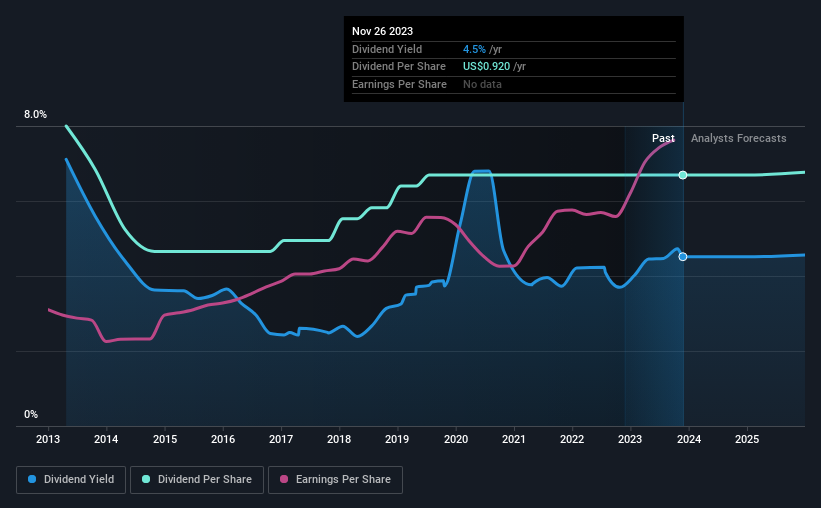First Financial Bancorp. (NASDAQ:FFBC) Looks Interesting, And It's About To Pay A Dividend
Readers hoping to buy First Financial Bancorp. (NASDAQ:FFBC) for its dividend will need to make their move shortly, as the stock is about to trade ex-dividend. The ex-dividend date is usually set to be one business day before the record date which is the cut-off date on which you must be present on the company's books as a shareholder in order to receive the dividend. The ex-dividend date is important as the process of settlement involves two full business days. So if you miss that date, you would not show up on the company's books on the record date. Meaning, you will need to purchase First Financial Bancorp's shares before the 30th of November to receive the dividend, which will be paid on the 15th of December.
The company's upcoming dividend is US$0.23 a share, following on from the last 12 months, when the company distributed a total of US$0.92 per share to shareholders. Looking at the last 12 months of distributions, First Financial Bancorp has a trailing yield of approximately 4.5% on its current stock price of $20.38. Dividends are an important source of income to many shareholders, but the health of the business is crucial to maintaining those dividends. We need to see whether the dividend is covered by earnings and if it's growing.
See our latest analysis for First Financial Bancorp
Dividends are usually paid out of company profits, so if a company pays out more than it earned then its dividend is usually at greater risk of being cut. Fortunately First Financial Bancorp's payout ratio is modest, at just 32% of profit.
Generally speaking, the lower a company's payout ratios, the more resilient its dividend usually is.
Click here to see the company's payout ratio, plus analyst estimates of its future dividends.
Have Earnings And Dividends Been Growing?
Businesses with strong growth prospects usually make the best dividend payers, because it's easier to grow dividends when earnings per share are improving. If business enters a downturn and the dividend is cut, the company could see its value fall precipitously. For this reason, we're glad to see First Financial Bancorp's earnings per share have risen 12% per annum over the last five years.
The main way most investors will assess a company's dividend prospects is by checking the historical rate of dividend growth. First Financial Bancorp has seen its dividend decline 1.8% per annum on average over the past 10 years, which is not great to see.
Final Takeaway
From a dividend perspective, should investors buy or avoid First Financial Bancorp? When companies are growing rapidly and retaining a majority of the profits within the business, it's usually a sign that reinvesting earnings creates more value than paying dividends to shareholders. Perhaps even more importantly - this can sometimes signal management is focused on the long term future of the business. Overall, First Financial Bancorp looks like a promising dividend stock in this analysis, and we think it would be worth investigating further.
On that note, you'll want to research what risks First Financial Bancorp is facing. We've identified 2 warning signs with First Financial Bancorp (at least 1 which doesn't sit too well with us), and understanding them should be part of your investment process.
A common investing mistake is buying the first interesting stock you see. Here you can find a full list of high-yield dividend stocks.
Have feedback on this article? Concerned about the content? Get in touch with us directly. Alternatively, email editorial-team (at) simplywallst.com.
This article by Simply Wall St is general in nature. We provide commentary based on historical data and analyst forecasts only using an unbiased methodology and our articles are not intended to be financial advice. It does not constitute a recommendation to buy or sell any stock, and does not take account of your objectives, or your financial situation. We aim to bring you long-term focused analysis driven by fundamental data. Note that our analysis may not factor in the latest price-sensitive company announcements or qualitative material. Simply Wall St has no position in any stocks mentioned.

